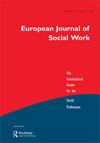Developing and integrating professional resilience: influencing factors for social workers as students and new practitioners
IF 1.6
3区 社会学
Q2 SOCIAL WORK
引用次数: 0
Abstract
ABSTRACTIncreasingly complex practice contexts challenge social workers’ resilience, impacting workforce attraction and retention. This study comprised longitudinal and qualitative research to understand what influences professional resilience development, maintenance and integration. Purposive sampling resulted in the inclusion of 23 participants from eight Australian universities. Interviews occurred when the participants were students nearing the completion of a Master of Social Work (Qualifying) degree and again after approximately six months of post-qualifying practice. The results reveal social workers’ resilience develops over time through processing experiences that occur within contexts and shape professional identity. Supportive relationships are integral to this process, becoming protective resources during adversity. In universities and human service organisations, relationships with peers, teams, direct line managers, and supervisors are crucial for enabling insight and growth through critically reflecting on experiences and understanding their impact on professional identity formation and resilience. A disparity emerged between the expectation of available resources as a student and the reality as a newly qualified social worker. The relational nature of resilience has implications for educating social work students and preparing them for practice realities, organisations seeking to sustain a resilient workforce, and practitioners who navigate these complex contexts.KEYWORDS: Social work educationsocial work resilienceworkforce wellbeing Disclosure statementNo potential conflict of interest was reported by the author(s).Additional informationNotes on contributorsClarissa HitchcockClarissa Hitchcock is a Doctoral Candidate and Associate Lecturer in Social Work, Faculty of Health, Southern Cross University. As a qualified social worker, Clarissa worked for over 20 years in direct practice with children and families. Her Doctoral Degree is investigating the role of education in supporting social work students to develop and integrate professional resilience.Louise WhitakerLouise Whitaker PhD is a Senior Lecturer in Social Work and Community Welfare, Faculty of Health, Southern Cross University. Her research and practice interests include critical reflection and mental health social work.Mark HughesMark Hughes (he/him) is Professor of Social Work in the Faculty of Health, Southern Cross University. His research and practice interests centre on ageing and aged care services, social work with older people, and the organisational dimensions of social work practice. Since 2002 he has published widely on lesbian, gay, bisexual, transgender, gender diverse and queer (LGBTQ+) ageing, which has examined LGBTQ+ health disparities, caregiving networks, loneliness, end-of-life care, and sexual identity expression in aged care. Mark is Editor-in-Chief of the Australasian Journal on Ageing.Lynne McPhersonDr Lynne McPherson is an Associate Professor, Social Work in the Faculty of Health, Southern Cross University. She is also the Deputy Director of the Centre for Children and Young People, Southern Cross University. Lynne’s research interests include: responses to complex developmental trauma, therapeutic approaches in out-of-home care, child, youth and family issues, and supervision and leadership.发展和整合专业弹性:社会工作者作为学生和新从业者的影响因素
摘要越来越复杂的实践环境挑战着社会工作者的弹性,影响着劳动力的吸引力和保留。本研究采用纵向研究和定性研究相结合的方法来了解影响职业弹性发展、维持和整合的因素。有目的的抽样结果包括来自8所澳大利亚大学的23名参与者。当参与者是接近完成社会工作硕士(合格)学位的学生时,进行面试,并在大约六个月的合格实习后再次进行面试。结果表明,随着时间的推移,社会工作者的弹性是通过处理发生在环境中的经历和塑造职业认同而发展起来的。支持关系是这个过程中不可或缺的一部分,在逆境中成为保护资源。在大学和人力服务组织中,与同事、团队、直接经理和主管的关系对于通过批判性地反思经验和理解它们对职业身份形成和弹性的影响来实现洞察力和成长至关重要。作为一名学生对可用资源的期望与作为一名新合格的社会工作者的现实之间出现了差距。弹性的关系性质对教育社会工作学生并为实践现实做好准备,寻求维持弹性劳动力的组织,以及在这些复杂环境中导航的从业者都有影响。关键词:社会工作教育社会工作弹性劳动力福利披露声明作者未报告潜在的利益冲突。克拉丽莎·希区柯克(clarissa Hitchcock)是南十字星大学卫生系的博士候选人和社会工作副讲师。作为一名合格的社会工作者,克拉丽莎在与儿童和家庭的直接实践中工作了20多年。她的博士学位是研究教育在支持社会工作学生发展和整合专业弹性方面的作用。Louise Whitaker博士,南十字星大学卫生学院社会工作与社区福利高级讲师。她的研究和实践兴趣包括批判性反思和心理健康社会工作。Mark Hughes(他/他)是南十字星大学卫生学院社会工作教授。他的研究和实践兴趣集中在老龄化和老年护理服务、老年人社会工作以及社会工作实践的组织层面。自2002年以来,他发表了大量关于女同性恋、男同性恋、双性恋、变性人、性别多样性和酷儿(LGBTQ+)老龄化的文章,研究了LGBTQ+的健康差距、护理网络、孤独、临终关怀和老年护理中的性身份表达。马克是《澳大利亚老龄化杂志》的主编。Lynne McPherson博士是南十字星大学卫生学院社会工作副教授。她还是南十字星大学儿童和青少年中心的副主任。林恩的研究兴趣包括:对复杂发育创伤的反应,家庭外护理的治疗方法,儿童,青少年和家庭问题,以及监督和领导。
本文章由计算机程序翻译,如有差异,请以英文原文为准。
求助全文
约1分钟内获得全文
求助全文
来源期刊

European Journal of Social Work
SOCIAL WORK-
CiteScore
3.50
自引率
20.00%
发文量
96
期刊介绍:
The European Journal of Social Work provides a forum for the social professions in all parts of Europe and beyond. It analyses and promotes European and international developments in social work, social policy, social service institutions, and strategies for social change by publishing refereed papers on contemporary key issues. Contributions include theoretical debates, empirical studies, research notes, country perspectives, and reviews. It maintains an interdisciplinary perspective which recognises positively the diversity of cultural and conceptual traditions in which the social professions of Europe are grounded. In particular it examines emerging European paradigms in methodology and comparative analysis.
 求助内容:
求助内容: 应助结果提醒方式:
应助结果提醒方式:


